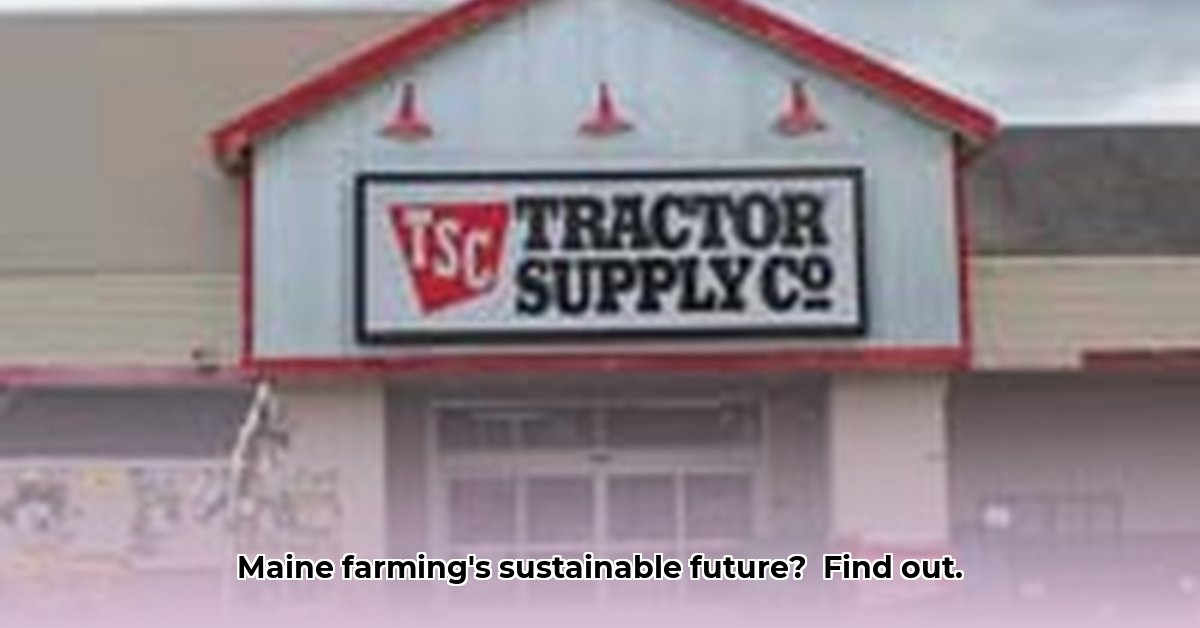
Tractor Supply Company Waterville, Maine: A Partner in Sustainable Farming?
Growing food in Maine presents unique challenges, yet the rewards are immense. For many local farmers and gardeners, Tractor Supply Company (TSC) in Waterville plays a key role in their success. This article examines TSC's contribution to sustainable agriculture in the area, highlighting both its strengths and areas for improvement. We'll explore their product offerings, community engagement, and suggest actionable steps for a greener future. For more information on TSC's partnership with New Holland, visit this page.
Tractor Supply's Product Offerings: Seeds of Change?
TSC Waterville offers a range of products relevant to sustainable agriculture. They stock over 20 varieties of organic seeds, providing a foundation for environmentally conscious farming. Eco-friendly fertilizers and water-conserving tools are also available, although the extent of their selection and prominence within the store requires further investigation. A crucial element is the accessibility of these sustainable options. Are they easily located and clearly marked? This seemingly small detail significantly impacts whether farmers choose sustainable options. Beyond seeds and fertilizers, consider the tools and their efficiency. Investing in equipment designed for minimal fuel consumption reduces environmental impact. Even the packaging of these products offers an opportunity for sustainable practices; are the materials recyclable?
Community Engagement: Fostering a Sustainable Ecosystem
TSC's impact extends beyond product sales. However, the level of its community engagement needs further clarification. Does the Waterville store actively engage with local farmers? Are workshops on crucial topics like soil health or composting offered? Partnerships with organizations like the Maine Organic Farmers and Gardeners Association could significantly broaden their outreach and positive influence. The potential exists to transform the store into a vibrant hub for knowledge sharing. Imagine in-store demonstrations by local experts on water-wise gardening, or interactive sessions on selecting the best organic seeds for Maine's climate. This direct engagement builds a stronger, more sustainable community.
Limitations and Areas for Improvement: Cultivating Growth
While TSC offers a valuable resource, opportunities for improvement exist. More transparent data on sustainable product sales would greatly enhance understanding of their commitment. Knowing the percentage of sales derived from eco-friendly products provides a clear measure of success. Similarly, transparency regarding their supply chain – knowing the origin of their products – empowers environmentally conscious consumers to make informed choices. A comprehensive environmental impact assessment of their operations would further build consumer trust. Implementing more robust sustainability initiatives isn't just environmentally beneficial; it strengthens brand image and attracts a wider customer base.
Actionable Steps for Stakeholders: Harvesting a Greener Future
To maximize their contribution to sustainable agriculture, TSC and other stakeholders can take the following steps:
Tractor Supply Management: Analyze sustainable product sales data. Expand the range of eco-friendly products offered, and actively promote them through targeted marketing and in-store displays. Organize regular workshops or educational events focusing on sustainable agricultural practices. Develop a comprehensive sustainability report and integrate sustainability into the company culture.
Local Farmers and Gardeners: Prioritize purchasing eco-friendly products from TSC. Actively engage with TSC management by suggesting products or workshops based on their needs. Share best practices with the store and other farmers, fostering collaboration.
Maine Department of Agriculture: Collaborate with TSC to host workshops and educational events. Jointly fund research projects focusing on sustainable farming practices tailored to Maine's climate.
Consumers: Support businesses dedicated to sustainability. Demand more eco-friendly options from all retailers. Actively voice your preferences to influence product choices.
Conclusion: A Shared Harvest for Maine
Tractor Supply Company in Waterville holds a significant position within the local agricultural community. However, its potential to promote sustainable practices is far from fully realized. By strengthening its commitment to eco-friendly products and actively engaging with the community, TSC can significantly enhance its impact on Maine's agricultural landscape. The future of sustainable farming in Maine relies on collaboration and shared responsibility, and together, we can cultivate a thriving and environmentally responsible future.